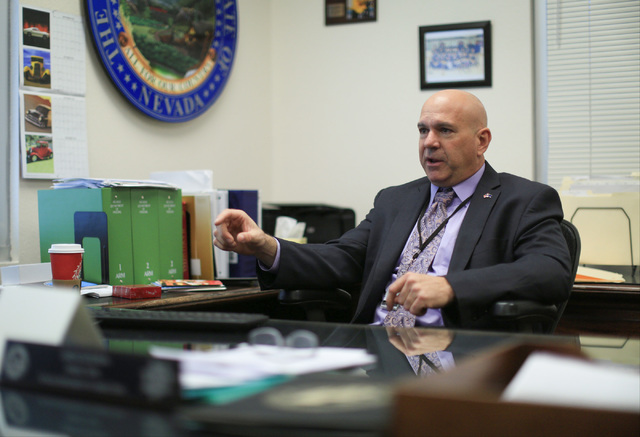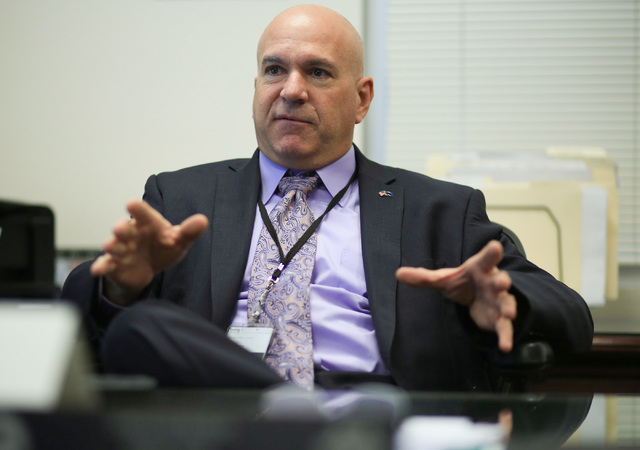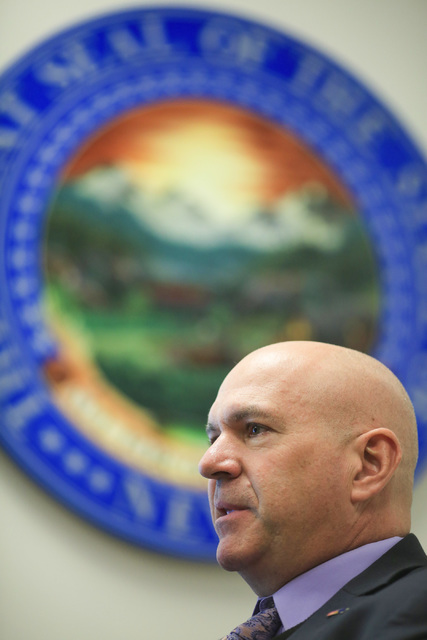Year of big changes ahead for Nevada’s prison system, corrections chief says
Expect 2017 to be a year of big changes for Nevada’s prison system.
The state Corrections Department in 2016 took a critical look at its use-of-force policies and examined ways to improve treatment for inmates with significant mental illnesses, among other things.
And department Director James Dzurenda said he’s only getting started.
Dzurenda, who assumed command of the department in April after a long career in state and federal corrections and law enforcement, spoke with the Las Vegas Review-Journal before the holidays to recap steps taken in 2016 and to preview some of the turns ahead.
“2017 is going to be our biggest impact year,” he said. “Really, it’s like creating a whole new agency.”
USE OF FORCE
Dzurenda took the reins of the Corrections Department amid a perfect storm of sorts. That was the same month state prosecutors decided to charge a former prison guard at High Desert State Prison in the shooting death of Carlos Perez, 28, who was killed during a fight with another inmate on Nov. 12, 2014.
Perez’s death and the ensuing — and ongoing — legal battles raised questions about the department’s use of shotguns in prison facilities as a crowd control tool.
Dzurenda ended the practice in May and said corrections officers are now receiving training on de-escalation tactics and being equipped with more nonlethal “tools on their tool belt,” such as rubber bullets and pepper spray canisters.
He said the change has already resulted in a significant reduction in use-of-force incidents. In 2017, he said, the department will look at other changes that could improve inmate behavior and reduce the need for force, including fixing the department’s troubled system for inmate grievances.
HIV DISCLOSURE
Dzurenda this year discovered what he considers a major flaw in prison regulations — and state law. Current law requires an inmate’s nonmedical records be marked if they test positive for HIV — the virus that causes AIDS — during intake. HIV-positive inmates are kept out of the general population units in segregated units.
Dzurenda said the process violated the inmates’ rights to medical privacy as well as federal regulations. It also created a false sense of security among guards.
Corrections officers need to approach every incident with caution to avoid biological hazards, not just be careful around certain inmates, he said.
The department will ask the Legislature to update those laws about inmates who have HIV during the 2017 session.
MENTAL HEALTH
The agency’s treatment of mentally ill inmates was a big part of Dzurenda’s 2016 agenda and will continue to be a priority in the new year.
Dzurenda said he noticed dozens of inmates with serious mental issues at the Ely State Prison, a maximum-security facility in rural White Pine County where mental health resources are scarce. The director decided to move the department’s worst cases up to a facility near Carson City, where there are more psychiatric and other medical professionals.
In the coming year, Dzurenda plans to create “step-down units” that will keep mentally ill inmates who need the most supervision under close watch but allow those responding well to therapies and medications to ease into the general population.
The department also is looking at asking the Legislature to create an electronic system for sharing inmates’ medical information, such as successful treatments, with hospitals outside the system, and vice versa. That would allow inmates to maintain successful regimens on the outside and get better treatment while incarcerated, Dzurenda said.
In any case, staff members will receive more training on mental health diagnoses to be able to better handle those inmates, he said.
COLLABORATIONS
Fostering relationships throughout the state will be critical to the agency in 2017.
Researchers at Nevada’s universities are partnering with the department to track trends and begin to develop best practices. Dzurenda said he wants every prison program to have a three-year track record of proven success, and he wants to cut outdated or ineffective programs.
The agency is working with the U.S. Department of Justice to bring Nevada prisons up to current federal standards — a requirement for the state to continue to receive federal grants to help reduce recidivism and improve re-entry programs.
In the coming year, the department is participating in a Vera Institute of Justice program to help the department reduce its use of solitary confinement or segregation.
CULTURE CHANGE
The agency is seeking more money in 2017 for prison programs, increased staffing and improved pay for corrections officers, Dzurenda said. But evolving the department also will require a commitment from Nevadans and a cultural shift within the agency, he said.
To that end Dzurenda’s been talking to Rotary clubs, chambers of commerce and the media about the department’s new directions. He’s also been working with the governor’s office and meeting with legislators.
His pitch is simple: The more you improve the job the agency does rehabilitating inmates, the safer communities will be. Because the vast majority of inmates will be released sooner rather than later — only about 12 percent have sentences of 20 or more years — emphasizing rehabilitation and reducing recidivism will have a positive effect on public safety and ultimately save taxpayers money, he says.
Contact Wesley Juhl at wjuhl@reviewjournal.com and 702-383-0391. Follow @WesJuhl on Twitter.































